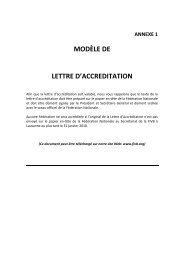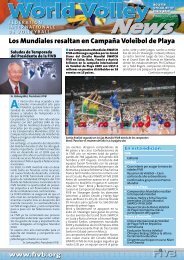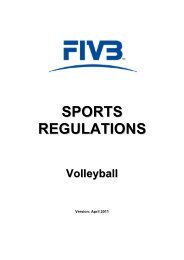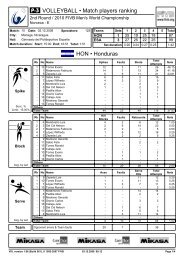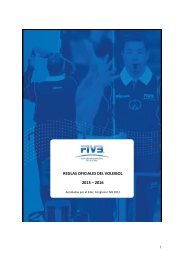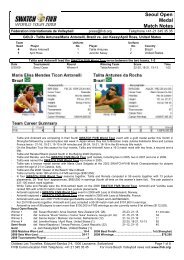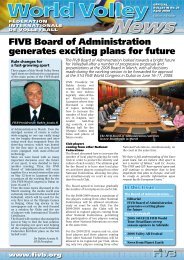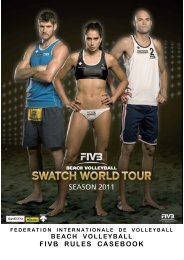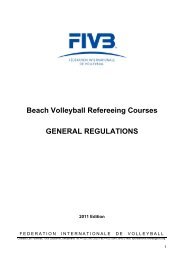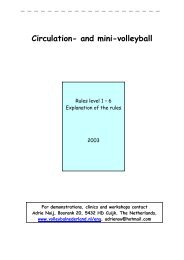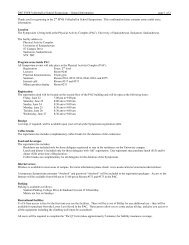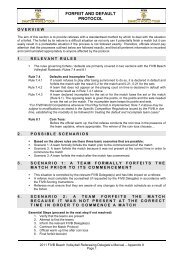Referees - Medical control during competitions - FIVB
Referees - Medical control during competitions - FIVB
Referees - Medical control during competitions - FIVB
Create successful ePaper yourself
Turn your PDF publications into a flip-book with our unique Google optimized e-Paper software.
<strong>Referees</strong> - <strong>Medical</strong> <strong>control</strong> <strong>during</strong> <strong>competitions</strong>1.1 Prior to participating in international <strong>FIVB</strong> sanctioned <strong>competitions</strong>, thereferees must present evidence of adequate health and fitness to permitcompletion of their assigned duties. The referee must therefore submit theappropriate form verifying their state of health, as determined by theirphysician, once annually.1.2 In all <strong>FIVB</strong> events, before starting the competition, the <strong>Medical</strong> Delegateshould perform a medical check (history, blood pressure, visual acuity, visualfield, color blindness, height and weight (to calculate body mass index),abdominal circumference. The medical examination should take place as earlyas possible after arrival at the event. The results of this examination should berecorded on a report form, which should be sealed and sent to the <strong>FIVB</strong><strong>Medical</strong> Department at the conclusion of the event. The recommendationsbased on the medical examination as to the suitability of each of the refereesshould be communicated to the president of the Control Committee forvolleyball events and the Technical Supervisor for beach volleyball events,who are the only persons entitled to exclude a referee from a competition afterthe report of the <strong>Medical</strong> Delegate. The details of the health examinationshould be kept confidential.1.3. Prior to official <strong>FIVB</strong> <strong>competitions</strong>, the first and second referee, and thealternate referee, line judges and scorers may be asked to undergo a breathanalysis to ensure they are not intoxicated. Such random testing should bearranged by the local medical staff, and should be performed in the presenceof the <strong>FIVB</strong> <strong>Medical</strong> Delegate and/or the <strong>FIVB</strong> Referee Delegate.1.4 The <strong>FIVB</strong> <strong>Medical</strong> Delegate must ratify the alcohol <strong>control</strong> procedure before itis undertaken, to ensure that it is reproducible, sensitive, and that the user’sbreath alcohol content is reported in appropriate units to permit comparisonwith the <strong>FIVB</strong> standard.<strong>FIVB</strong> <strong>Medical</strong> Commissionmedical@fivb.org
1.5 Procedures:a) Forty-five minutes before the start of the match, the designated referees mustbe present in the <strong>control</strong> room. They should be instructed to not consumeanything by mouth for 15 minutes prior to undergoing breath analysis.b) The highest level of alcohol permitted is 0.1 promille (mg/L).c) In the case of a positive reaction, a second test will be conducted after fifteenminutes.d) If the second test is also positive, the referee must then be replaced by the<strong>FIVB</strong> Referee Delegate.e) If the referee, whose alcohol breath test proved positive contests the results,he or she may request a confirmatory blood test to be performed.f) The results of this examination should be recorded on a report form.g) The <strong>FIVB</strong> Refereeing Commission will decide on the appropriate sanctions inthe case of a positive alcohol <strong>control</strong>.<strong>FIVB</strong> <strong>Medical</strong> Commissionmedical@fivb.org



